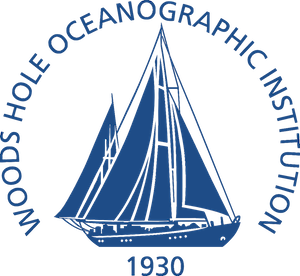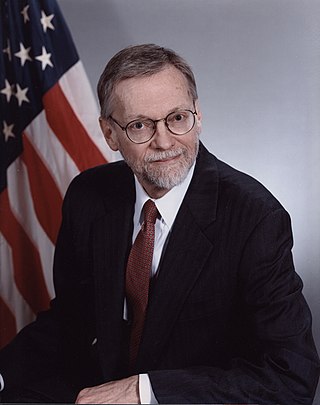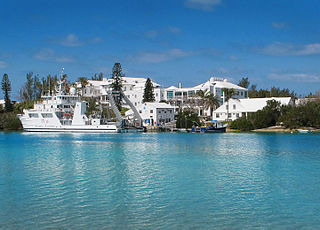
The National Oceanic and Atmospheric Administration is a Washington, D.C.–based scientific and regulatory agency within the United States Department of Commerce, a United States federal government department. The agency is charged with forecasting weather, monitoring oceanic and atmospheric conditions, charting the seas, conducting deep sea exploration, and managing fishing and protection of marine mammals and endangered species in the U.S. exclusive economic zone.

The Woods Hole Oceanographic Institution is a private, nonprofit research and higher education facility dedicated to the study of marine science and engineering.

The National Centre for Space Studies is the French national space agency headquartered in central Paris and it comes under the supervision of the French Ministries of Defence and Research.
The National Oceanographic Data Center (NODC) was one of the national environmental data centers operated by the National Oceanic and Atmospheric Administration (NOAA) of the U.S. Department of Commerce. The main NODC facility was located in Silver Spring, Maryland, and was made up of five divisions. The NODC also had field offices collocated with major government or academic oceanographic laboratories in Stennis Space Center, MS; Miami, FL; La Jolla, San Diego, California; Seattle, WA; Austin, Texas; Charleston, South Carolina; Norfolk, Virginia; and Honolulu, Hawaii. In 2015, NODC was merged with the National Climatic Data Center and the National Geophysical Data Center into the National Centers for Environmental Information (NCEI).

Argo is an international program that uses profiling floats to observe temperature, salinity, currents, and, recently, bio-optical properties in the Earth's oceans; it has been operational since the early 2000s. The real-time data it provides is used in climate and oceanographic research. A special research interest is to quantify the ocean heat content (OHC). The Argo fleet consists of almost 4000 drifting "Argo floats" deployed worldwide. Each float weighs 20–30 kg. In most cases probes drift at a depth of 1000 metres and, every 10 days, by changing their buoyancy, dive to a depth of 2000 metres and then move to the sea-surface, measuring conductivity and temperature profiles as well as pressure. From these, salinity and density can be calculated. Seawater density is important in determining large-scale motions in the ocean.
The Pacific Marine Environmental Laboratory (PMEL) is a federal laboratory in the National Oceanic and Atmospheric Administration (NOAA) Office of Oceanic and Atmospheric Research (OAR). It is one of seven NOAA Research Laboratories (RLs). The PMEL is split across two sites in the Pacific Northwest, in Seattle, Washington and Newport, Oregon.

Harbor Branch Oceanographic Institute is a non-profit oceanographic institution operated by Florida Atlantic University in Fort Pierce, Florida, United States. Founded in 1971 as non-profit research organization, the institution was transferred to FAU in 2007.

R/V Oceanus is a Regional Class research vessel owned by the National Science Foundation, based in Newport, Oregon, and maintained and operated by Oregon State University. The ship was originally delivered to the Woods Hole Oceanographic Institution (WHOI) for operation as a part of the U.S. Academic Research Fleet as a University-National Oceanographic Laboratory System (UNOLS) designated operator. in November, 1975. Oceanus made the first operational cruise in April, 1976 and operated under WHOI for thirty-six years in the Atlantic with some operations in the Mediterranean and Caribbean. The ship was scheduled to be retired in November 2011 but instead was transferred to Oregon State University, College of Earth, Ocean, and Atmospheric Sciences, for operation, replacing sister ship, R/V Wecoma.

The Environmental Science Services Administration (ESSA) was a United States Federal executive agency created in 1965 as part of a reorganization of the United States Department of Commerce. Its mission was to unify and oversee the meteorological, climatological, hydrographic, and geodetic operations of the United States. It operated until 1970, when it was replaced by the new National Oceanic and Atmospheric Administration (NOAA).

Richard R. Behn, is a retired one-star rear admiral of the National Oceanic and Atmospheric Administration Commissioned Officer Corps who served as director of the National Oceanic and Atmospheric Administration's Marine and Aviation Operations Centers, from August 2004 to September 2007. He was nominated for this position by President George W. Bush, confirmed by the Senate, and subsequently promoted to rear admiral in August 2004.
The Bermuda Institute of Ocean Sciences (BIOS) is an independent, non-profit marine science and education institute located in Ferry Reach, St. George's, Bermuda. Since modest beginnings as a seasonal field station in 1903, BIOS has grown into an internationally recognized center for ocean science, atmospheric research and environmental monitoring and mapping. By investing in top-tier resident scientists and robust infrastructure—including R/V Atlantic Explorer, our UNOLS-compliant oceanographic research vessel—BIOS stands as a fact-based voice in a crowded conversation around the state of our planet’s ocean and climate.

Koppillil Radhakrishnan is an Indian space scientist who headed the Indian Space Research Organisation (ISRO) between November 2009 and December 2014 as Chairman of Space Commission, Secretary of the Department of Space and Chairman of ISRO. Prior to this, he was the Director of Vikram Sarabhai Space Centre (2007-2009) and Director of National Remote Sensing Agency (2005-2008) of the Department of Space. He had a brief stint of five years (2000-2005) in the Ministry of Earth Sciences as Director of Indian National Centre for Ocean Information Services (INCOIS).

Donald James Baker is an American scientist who was trained as a physicist, practiced as an oceanographer, and has held science and management positions in academia, non-profit institutions, and government agencies. He a former Under Secretary of Commerce for Atmosphere and Oceans and Administrator of the U.S. National Oceanic and Atmospheric Administration (NOAA), and currently Director, Global Carbon Measurement Program, William J. Clinton Foundation working with forestry programs in developing countries with the aim of reducing carbon dioxide emissions and at the same time helping alleviate poverty.

George Joseph is an Indian space scientist, best known for his contributions to the development of remote sensing technology in India, especially in the field of earth observation sensors. He is a former chairman of the Lunar Mission Study Task Force of the Indian Space Research Organization and an elected fellow of the National Academy of Sciences, India, Indian Academy of Sciences and Indian National Academy of Engineering. The Government of India awarded him the Padma Bhushan, the third highest civilian award, in 1999.

RV Atlantic Explorer is a twin-screw ocean vessel. It is owned and operated by the Bermuda Institute of Ocean Sciences (BIOS) in coordination with and as a part of the University-National Oceanographic Laboratory System (UNOLS) fleet. Atlantic Explorer is in compliance with US Coast Guard, UNOLS and American Bureau of Shipping (ABS) regulations as an uninspected oceanographic research vessel and is supported by the National Science Foundation (NSF). Its homeport is St. George's, Bermuda.
National Authority for Remote Sensing and Space Sciences (NARSS) is the pioneering Egyptian institution in the field of satellite remote sensing and space sciences.

Shailesh Nayak is an Indian scientist and is currently Director of the National Institute of Advanced Studies and Distinguished Scientist in the Ministry of Earth Sciences. He was the Chair of the Earth System Science Organization (ESSO) and Secretary to the Government of India for Ministry of Earth Sciences(MoES) Indian government, between August 2008 – 2015. He was also the Chairman of Earth Commission in India. He served as the interim chairman of ISRO between 31 December 2014 and 11 January 2015.

The Ocean Biodiversity Information System (OBIS), formerly Ocean Biogeographic Information System, is a web-based access point to information about the distribution and abundance of living species in the ocean. It was developed as the information management component of the ten year Census of Marine Life (CoML) (2001-2010), but is not limited to CoML-derived data, and aims to provide an integrated view of all marine biodiversity data that may be made available to it on an open access basis by respective data custodians. According to its web site as at July 2018, OBIS "is a global open-access data and information clearing-house on marine biodiversity for science, conservation and sustainable development." 8 specific objectives are listed in the OBIS site, of which the leading item is to "Provide [the] world's largest scientific knowledge base on the diversity, distribution and abundance of all marine organisms in an integrated and standardized format".












